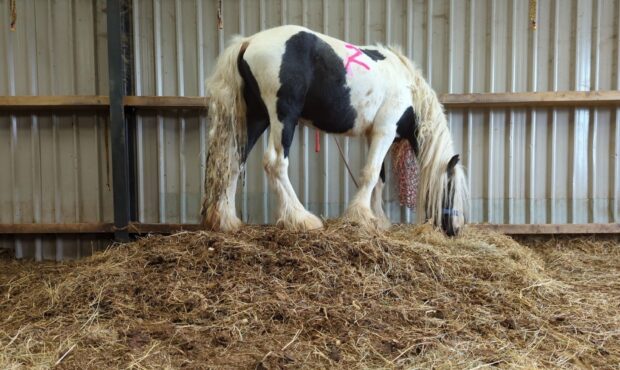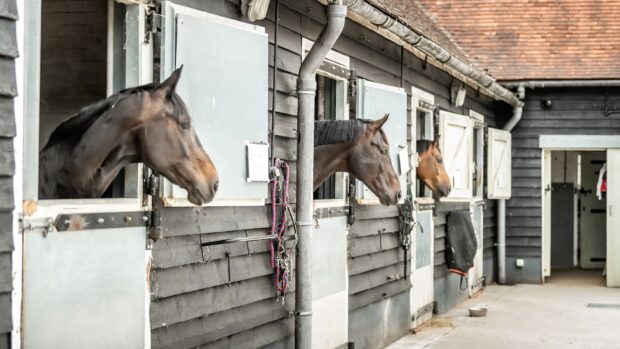The cost-of-living crisis and owners struggling to cope continue to be major concerns for equine welfare charities, which have been helping “desperate” owners and taking in large groups of horses this year.
Although some living costs have steadied in 2024, and inflation in November was 2.6% compared to 10.7% in November 2022, families around the UK continue to face high bills and financial pressures.
World Horse Welfare reported a 44% increase in welfare cases involving owners having more than 10 horses, up from 109 in 2023 to 157 in 2024. Cases involving owners with more than 50 horses have doubled.
“This is significant because not only do these rescues fill up the centres, they put pressure on the field officer team too,” a World Horse Welfare spokesperson told H&H, adding that the charity has had to invest in more equipment such as trailers and pens to accommodate these cases.
Word Horse Welfare launched its Help for Horse Owners initiative in February with the aim of preventing serious welfare cases by providing early intervention.
“We have lost count of the people we have helped when they have nowhere else to turn and are often at their lowest ebb,” said World Horse Welfare chief field officer Claire Gordon, adding that those the charity has helped usually say they wished they had known about the initiative sooner.
“We hope by highlighting this, we can reach more of the people who are struggling now, so they know a channel exists to seek help from, without judgement.”
By the end of November Redwings had taken in 98 equines, compared to 96 in 2023 – but the charity’s rehoming figures continue to decline. It rehomed 88 equines to guardian homes – who can be returned to the charity at any time – down from 101 in 2023.
“Rehoming has taken a worrying downturn with horses who would have had lots of interest in the past receiving limited interest despite our best efforts,” Redwings chief executive Lynn Cutress told H&H.
“We presume that this is yet another result of the cost-of-living crisis, which as a charity with over 2,000 equines to look after is affecting us in every way.”
Looking at the larger picture the RSPCA reported an overall decline in the past 10 years in reports of cruelty to and neglect of equines. But the number of equines taken in since 2014 “shows a less steady picture” – peaking at more than 900 in 2014, and again in 2017. The charity reported a “continuous drop” in this number between 2019 and 2021, but said the number has risen again since 2022.
“The cost-of-living crisis may explain the rising numbers of abandonments and horses taken into care in the past few years, and it is worrying that we have seen an increase in abandonments in 2022 and 2023 – although abandonments are still less than half what they were 10 years ago,” said RSPCA horse welfare expert Mark Kennedy.
“But our research suggests that there is a growing epidemic of poor welfare in the equine population of England and Wales. Often issues may not meet the legal threshold for us to take action under current animal welfare law. But it does mean that many horses may be surviving rather than thriving – and that should concern all of us.”
South Bristol-based HorseWorld reported a 143% increase in reports made to the charity from 40 in 2014 to 97 in 2024; from members of the public, other charities, landowners, and police.
“In many calls we’ve had from owners, especially in the last 12 months, we’ve heard how they have been struggling to make ends meet for some time,” said HorseWorld’s head of equine welfare Sarah Hollister.
“It’s rarely one thing which has caused them to reach out. We’ve repeatedly heard from owners for whom the rising costs of everyday life have had a massive impact on what was already a very tight budget. It just takes one thing to go wrong, or for one unforeseen cost or illness, and they’re desperate.”
The charity also reported that the total equines it estimates “are potentially at risk” in its area has increased by 38%, from 156 in 2014 to 216 in 2024.
“Since 2014 we have been involved in a number of cases involving very large numbers at one site. For example, in 2021 we saw an exceptional peak of identifying over 600 equines being potentially at risk; caused by one case involving over 300 ponies, two cases involving over 70, as well as a number of other large groups,” said Ms Hollister.
HAPPA chief executive Sarah Arthur said the type of help needed by owners has changed.
“Reports of cruelty and neglect are still being reported, however cries for help from owners trying to do the right thing are more prevalent. We are seeing an increase of owners reaching out for help due to financial and medical difficulties. Intervention is needed by way of advice and or a sign over to ensure that the welfare of the equine is not compromised,” she said.
Ms Arthur added that when the Control of Horses Act came into force in 2015 there was an overall drop in abandonment cases; prior to 2018 approximately 40% of the equines taken in annually by the charity were classed as abandonment cases. Between 2018 and 2022 this decreased to less than 5%, but in recent years 20% of HAPPA’s intake figure is attributed to abandonment.
“The change in the demographic certainly seems to be a response to the cost-of-living crisis. Demand for HAPPA’s services remains consistent, the type of help needed is changing, and intake and rehoming figures remain balanced. Will this be a trend that continues, only time will tell,” she said.
- To stay up to date with all the breaking news throughout major shows such as London International and more, subscribe to the Horse & Hound website
You may also be interested in:

Subscribe to Horse & Hound magazine today – and enjoy unlimited website access all year round

New service launched for owners struggling to care for their horses

‘Worrying picture’ as owners go without food to feed their horses




